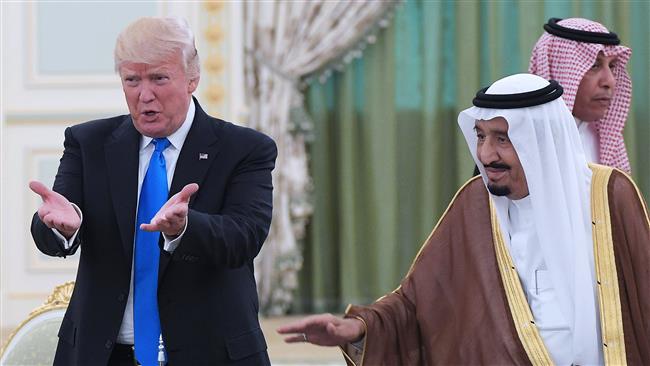
RNA - The Saudi monarch warned Trump against a furious backlash from the Muslim world over such an embassy transfer, but stopped short of announcing the kingdom’s position on the US president’s plan to recognize Jerusalem al-Quds as the capital of Israel.
The warning, however, has been widely perceived as a theatrical political gesture amid widespread reports that the kingdom plans to establish official ties with Israel, and has even outlined a roadmap to that effect.
"Moving the US embassy is a dangerous step that provokes the feelings of Muslims around the world," said Salman during a phone conversation on Tuesday with Trump, despite the monarchy's proximity to the Israeli regime.
Numerous reports have recently emerged suggesting growing ties between Tel Aviv and Riyadh. The two sides have no diplomatic relations but are known to have long been secretly in contact.
Lebanon’s al-Akhbar newspaper published an undated secret letter from Saudi Foreign Minister Adel al-Jubeir to Crown Prince Mohammed bin Salman, in which Jubeir put forward a plan to normalize ties with Israel despite “risks” of a public backlash.
As part of the plan, the Saudis would contribute to the resolution of the Israeli-Palestinian conflict by proposing resettling Palestinian refugees in their host countries rather than helping them return to their homeland. The kingdom would also propose for Jerusalem al-Quds to be placed under international control administered by the United Nations.
Last month, Israeli Prime Minister Benjamin Netanyahu hailed the regime’s “secret” but “fruitful” cooperation with Arab governments. Israeli Energy Minister Yuval Steinitz also confirmed Tel Aviv's covert ties with Saudi Arabia and other Arab countries.
The conversation occurred after Trump "informed" Palestinian President Mahmoud Abbas of his intention to relocate the US embassy.
'Moving embassy crosses every red line'
Meanwhile, the Palestinian resistance movement Hamas has also warned that such a move would seriously heighten regional tensions.
"The American administration's recognition of occupied Jerusalem as the occupation's capital and moving its embassy to Jerusalem crosses every red line," said Hamas chief Ismail Haniya.
"Moving the American embassy to Jerusalem is a dangerous escalation and provides cover for the extremist government of (Israeli Prime Minister Benjamin) Netanyahu to carry out its plan to Judaize the city of Jerusalem.
The entire Jerusalem al-Quds is currently under Israel’s control, while the regime also claims the city’s eastern part, which hosts the third holiest Muslim site.
The city has been designated as “occupied” under international law since the 1967 Arab War, which Palestinians want as the capital of their future state.
Since the US Congress ruled in 1995 that the embassy be relocated from Tel Aviv, every president has deferred the troublesome measure by issuing a six-month waiver.
Egypt urges Trump to be cautious
Also on Tuesday, Egyptian President Abdel Fattah al-Sisi also told Trump that such a measure may endanger peace talks in the region, said Egyptian leader's spokesman Bassem Radi.
Sisi called on Trump "not to complicate the situation in the region by taking measures that jeopardize the chances of peace in the Middle East."
"Egypt's consistent position on maintaining the legal status of Jerusalem within the framework of international standards and relevant United Nations resolutions," he added.
Turkey, France and the EU have also voiced the opposition to such a move.
847/940